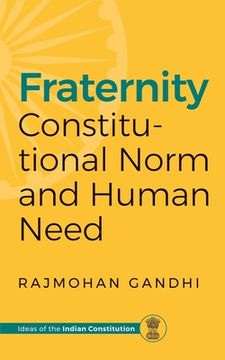Synopsis "Fraternity: Constitutional Norms and Human Need"
There's no dearth of references to a sense of kinship beyond one's familyor tribe in ancient Indian texts. We know from anecdotes in the Ramayanaand Mahabharata, the Upanishads and epigraphic sources like Ashoka's 12thMajor Rock Edict, that our ancestors were no strangers to an expansiveunderstanding of fraternity. Therefore, although the earliest adoption offraternity as state motto happened in 18th-century France, the West cannotclaim to have taught fraternity to India. Even so, it took our freedom struggleand the writing of the Constitution for it to become an integral valuegoverning our lives.While the idea of fraternity was implicit in the Motilal Nehru ConstitutionalDraft of 1928 and the 1931 Karachi Resolution of the Indian NationalCongress, the National Movement's commitment to it was questioned byleaders like Dr Babasaheb Ambedkar because the Movement appeared toprioritize the anti-colonial struggle over social reform to eliminate casteinequality. Dr Ambedkar, who had suffered caste oppression, knew that therecouldn't be a democratic future if caste wasn't done away with. However, hisantagonism with Mahatma Gandhi, the pre-eminent leader of the NationalMovement, is often amplified. This monograph argues, instead, that not onlydid both hold each other in high regard, it was due to Ambedkar's steadfastopposition to caste that, through Gandhi, modern Indian society learnt to takeits first steps towards embodying fraternity, even as it fought the Raj.Rajmohan Gandhi, one of India's leading and most admired thinkers, moveseasily from ancient India to modern Europe to an intimate portrait of the epicface-off between Gandhi and Ambedkar which led to the Poona Pact of 1932.This engaging monograph should be read by everyone invested in upholdingthe constitutional norm of fraternity in our increasingly divided country.

